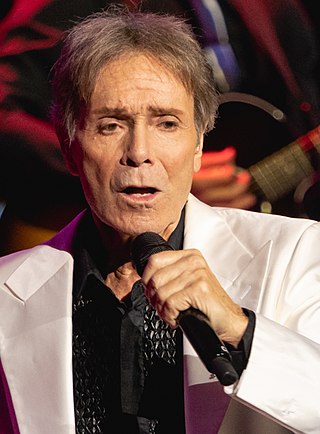
Sir Cliff Richard is a British singer and actor. He has total sales of over 21.5 million singles in the United Kingdom and, as of 2012, was the third-top-selling artist in UK Singles Chart history, behind the Beatles and Elvis Presley.

Lulu Kennedy-Cairns is a Scottish singer, songwriter, actress, and television personality. Her career has spanned six decades. Her debut single, a cover version of The Isley Brothers song "Shout", reached the top ten of the UK singles chart in 1964. In 1967, she rose to international prominence after appearing in the film To Sir, with Love, singing the theme song, which topped the US Billboard Hot 100 for five consecutive weeks.

Seán Patrick Michael Sherrard, also known professionally as Johnny Logan, is an Australian-born Irish singer, songwriter and musician. He is known for being the first of only two performers to win the Eurovision Song Contest as a lead singer twice.
The United Kingdom was represented at the Eurovision Song Contest 1989 with the song "Why Do I Always Get It Wrong", composed by John Beeby, with lyrics by Brian Hodgson, and performed by Live Report. The British participating broadcaster, the British Broadcasting Corporation (BBC), selected its entry through a national final.

"Love Shine a Light" is a song by British rock band Katrina and the Waves written by Kimberley Rew. It represented the United Kingdom in the Eurovision Song Contest 1997 held in Dublin, resulting in the country's fifth and most recent win at the contest. It was released as a single on 28 April 1997 and later included on the band's ninth studio album, Walk on Water (1997), serving as the album's lead single.

Pearl Lavinia Carr and Edward Victor "Teddy" Johnson were English husband-and-wife entertainers who were best-known during the 1950s and early 1960s. They were the UK's Eurovision entrants at the 1959 contest with "Sing, Little Birdie", which came second.

Eurovision: You Decide is the most recent name of a BBC television programme that was broadcast annually to select the United Kingdom's entry for the Eurovision Song Contest. The show had previously gone under several other names, including Festival of British Popular Songs (1957), Eurovision Song Contest British Final (1959–1960), The Great British Song Contest (1996–1999), Eurovision: Making Your Mind Up (2004–2007), Eurovision: Your Decision (2008), and Eurovision: Your Country Needs You (2009–2010), but was known, for most of its history, as A Song for Europe.

Scooch is a British pop group, comprising performers Natalie Powers, Caroline Barnes, David Ducasse and Russ Spencer.
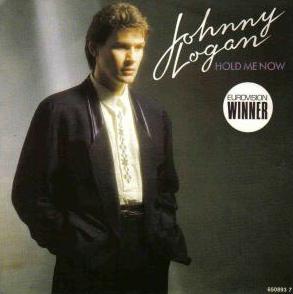
"Hold Me Now" is a song written and recorded by Irish singer-songwriter Johnny Logan. It represented Ireland in the Eurovision Song Contest 1987 held in Brussels, resulting in his second win at the contest, as well as the country's third victory.

"Diggi-Loo Diggi-Ley" is a song recorded by Swedish trio Herreys –brothers Per, Louis, and Richard Herrey–, with music composed by Torgny Söderberg and Swedish lyrics written by Britt Lindeborg. It was produced by Anders Engberg and Torgny Söderberg. It represented Sweden in the Eurovision Song Contest 1984, held in Luxembourg, winning the contest.

"Diva" is a song recorded by Israeli singer Dana International with music composed by Tzvika Pick and lyrics written by Yoav Ginai. It represented Israel in the Eurovision Song Contest 1998 held in Birmingham, resulting in the country's third win in the contest. Her win is considered influential in making trans identity mainstream.
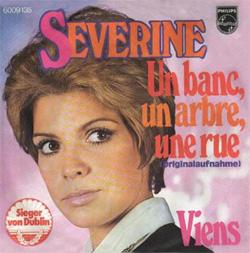
"Un banc, un arbre, une rue" is a song recorded by French singer Séverine, with music composed by Jean-Pierre Bourtayre and French lyrics written by Yves Dessca. It represented Monaco in the Eurovision Song Contest 1971 held in Dublin, resulting in the country's only ever win in the contest.

"Save Your Kisses for Me" is a song recorded by British group Brotherhood of Man, written by Tony Hiller with band members Lee Sheriden and Martin Lee. It represented the United Kingdom in the Eurovision Song Contest 1976 held in The Hague, winning the contest.

"Congratulations" is a song recorded by British singer Cliff Richard written by Bill Martin and Phil Coulter. It represented the United Kingdom in the Eurovision Song Contest 1968, held in London placing second behind the Spanish entry, "La, la, la".
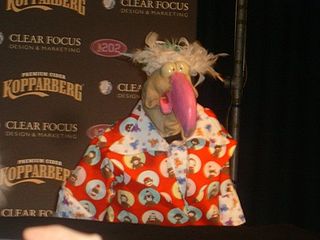
Dustin the Turkey, a character performed by John Morrison is a former star of RTÉ television's The Den between 1989 and 2010 and from 2020. He has been described as "the most subversive comedy force on Irish television".
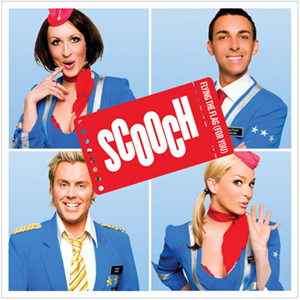
"Flying the Flag (For You)" is a song performed by British bubblegum pop dance group Scooch. The official single version was available from 30 April 2007 and was released as a physical CD single in the following week, on 7 May 2007. The song debuted on the UK Singles Chart at No. 5 and peaked at this position. It also charted in Ireland at number 48.
"Why Do I Always Get it Wrong?", written and composed by Brian Hodgson and John Beeby, was the United Kingdom's entry at the Eurovision Song Contest 1989, performed by the sextet Live Report, led by Ray Caruana.

Gianluca Bezzina is a Maltese medical doctor and part-time singer who represented Malta in the Eurovision Song Contest 2013 in Malmö, Sweden.

"Believe in Me" is a song by Welsh singer Bonnie Tyler from her sixteenth studio album Rocks and Honey (2013). American songwriter Desmond Child composed the song with British songwriters Lauren Christy and Christopher Braide. It was released as the album's lead single on 13 March 2013. The song was written to "uplift the world", and was completed by Child whilst having dinner with Tyler.

"Children of the Universe" is a song by British singer Molly Smitten-Downes. It was chosen by the British Broadcasting Corporation (BBC) to represent the United Kingdom at the Eurovision Song Contest 2014 in Denmark. The song was co-written by Smitten-Downes. An indie pop and alternative rock song, it became one of the favourites to win the contest. "Children of the Universe" finished in 17th place with 40 points and gave the UK its best placing since Blue came 11th place in the 2011 Contest. The song reached number twenty three on the UK Singles Chart and charted in Austria, Denmark, Germany, Ireland, Sweden, and Switzerland.

















